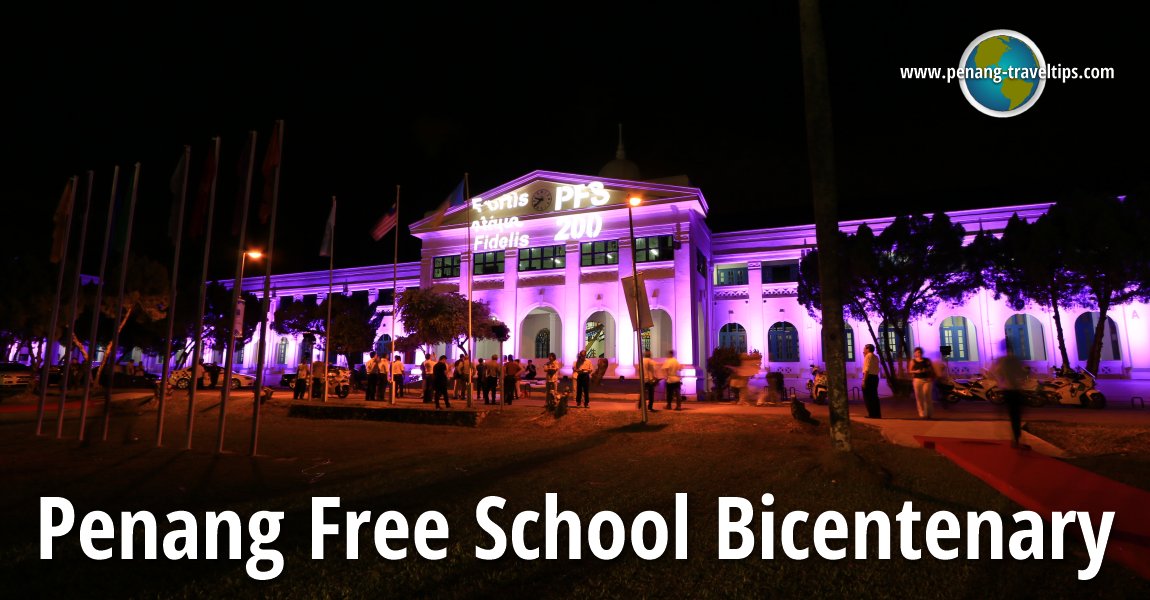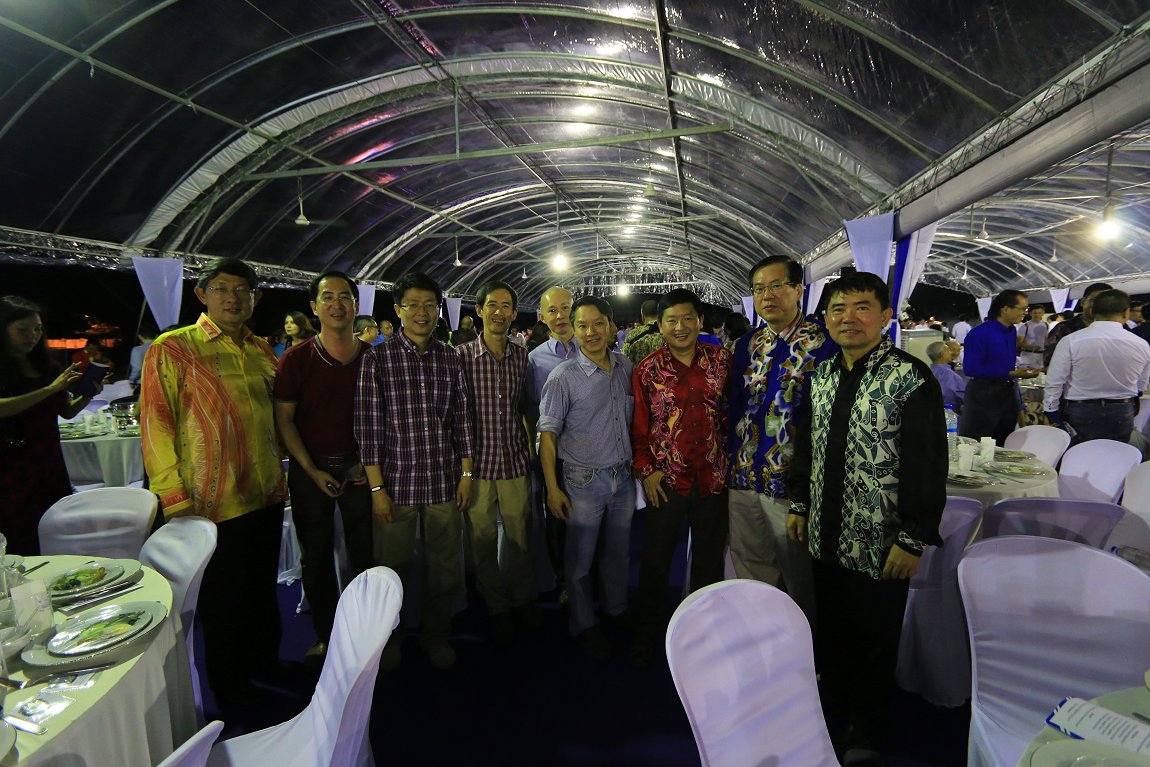
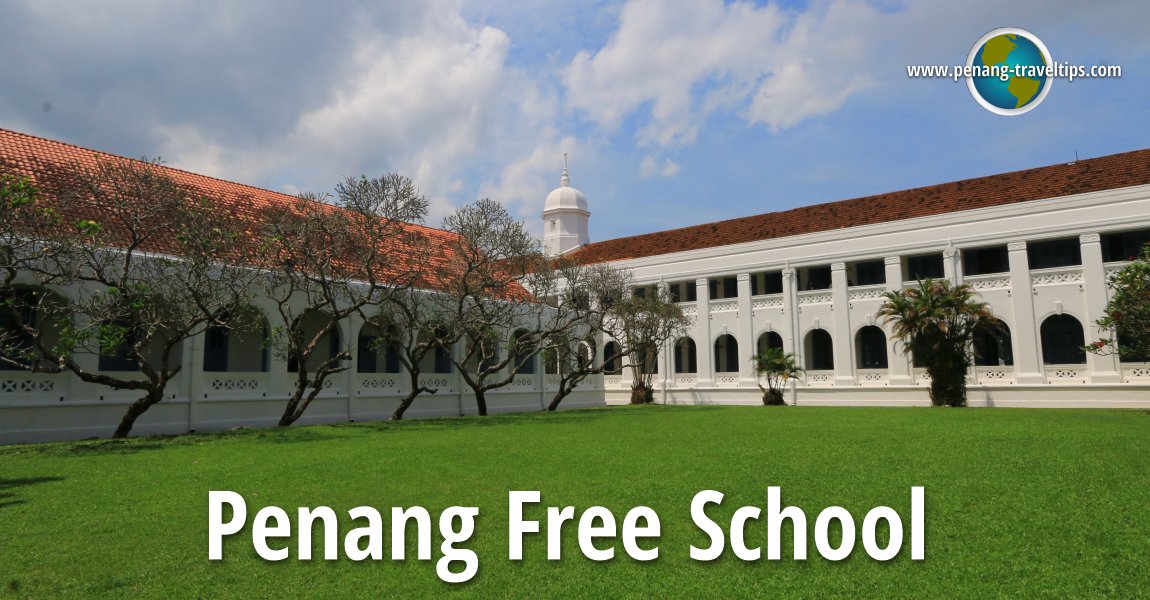 Penang Free School, photographed on the Bicentenary of the school. (21 October 2016)
Penang Free School, photographed on the Bicentenary of the school. (21 October 2016)
The Penang Free School is the oldest English-language school open to children of commoners in Southeast Asia. The person who is credited with leading the idea of setting up such a school was Reverend Sparke Hutchings, and the proposal was forwarded to the Governor of the then Prince of Wales Island in 1815.
The original plan, which was proposed by a committee set up by the Governor, called for two schools, one for boys, another for girls. Care was to be taken in providing secular education, and the sentiments of parents against any Christian teachings should be respected. Fees were collected only from those who could afford it. Children whose Malay and Indian parents do not wish for their children to be taught English could be taught in their own languages.
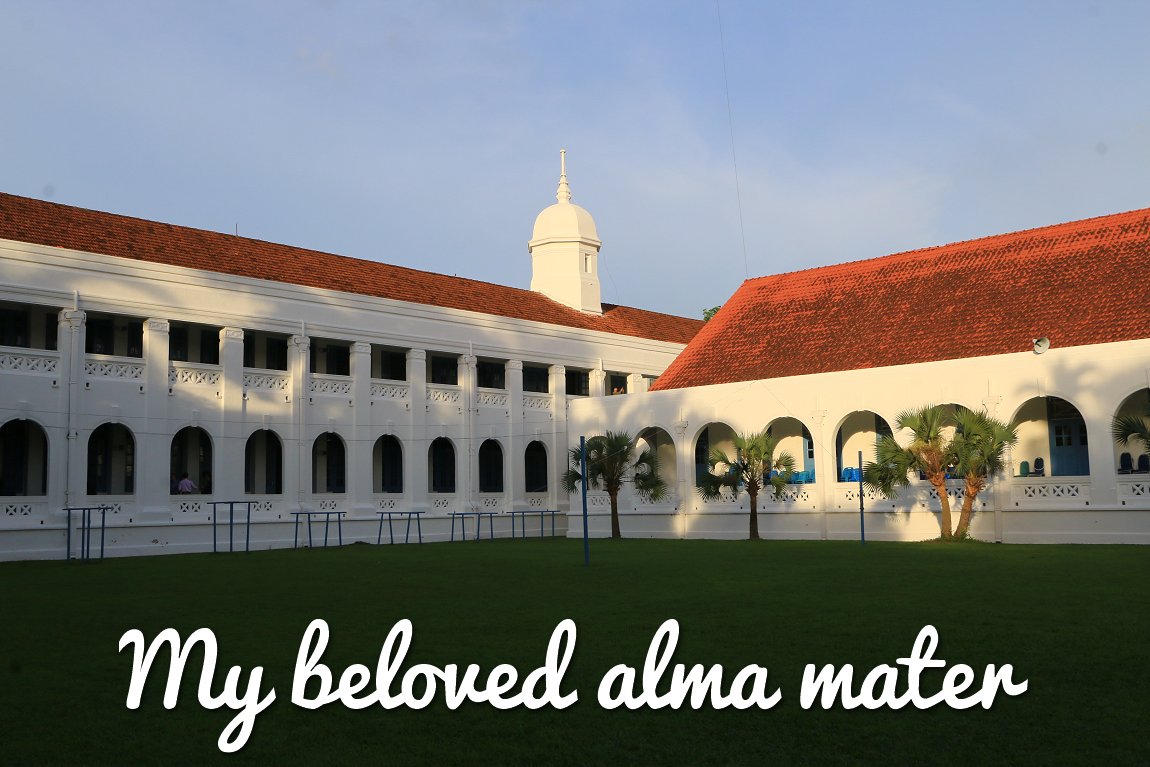 Penang Free School, my beloved alma mater (21 October 2016)
Penang Free School, my beloved alma mater (21 October 2016)
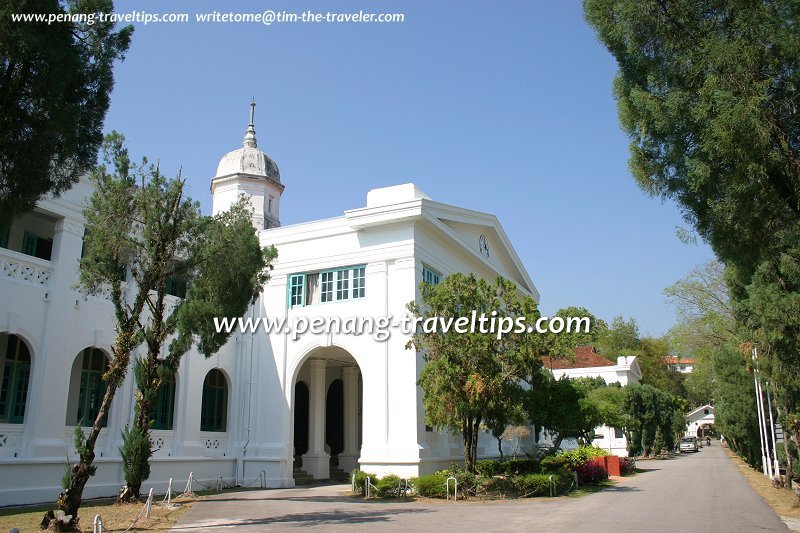 Penang Free School (29 January 2005)
Penang Free School (29 January 2005)
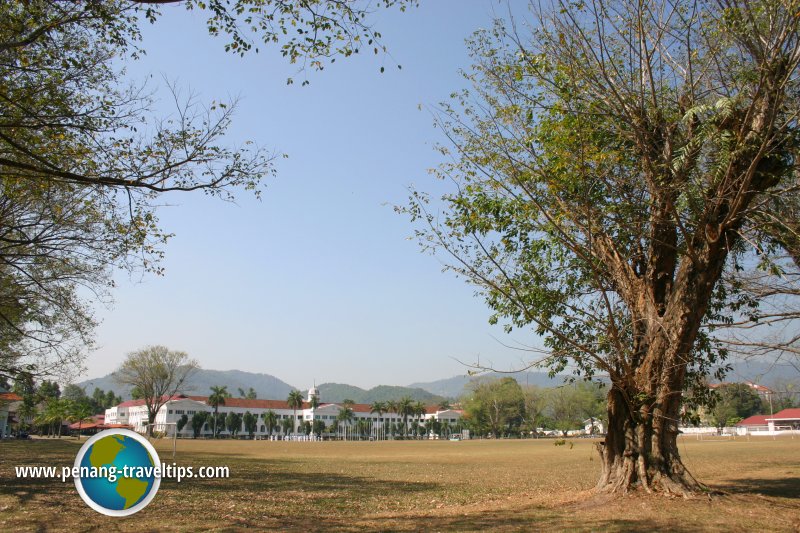 Penang Free School field (29 January 2005)
Penang Free School field (29 January 2005)
Special Feature: Penang Free School Bicentenary Celebrations
DetailsClass of 82/84 at the PFS Bicentenary Dinner
DetailsThose were the plans but they were never carried out in their entirety. A school was set up, on 21 October 1816, to commemorate the 30th anniversary of the demise of Captain Francis Light. It was housed in Love Lane, and at other rented premises, while awaiting the completion of the building in Church Square. As expected, the name Penang Free School created a misunderstanding. Many parents thought "free" means free from fees, but actually, the "free" means the school is "open to all".
As initially planned, within Penang Free School are the Malay school and Tamil school to conduct classes in the pupils' own languages. These were started in 1821, but lasted only a few years, although there was a branch of the Malay school in Gelugor that remained until 1863.
Up until 1897, the Penang Free School comprised a few isolated buildings that took up all the land granted to it. At the same time, a permanent building was under construction. It was a symmetrical structure to be built in two phases. The first phase was completed in 1896, and was the wing closest to the St. George's Anglican Church. The remaining wing was completed in 1906.
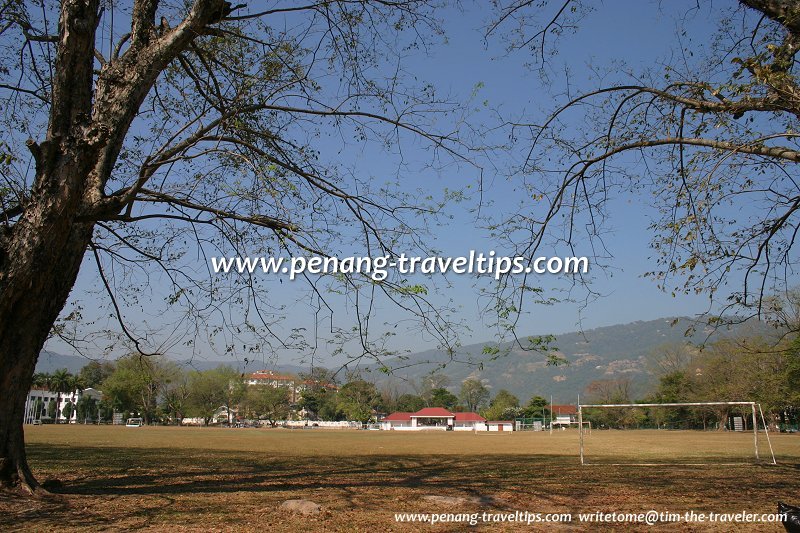 Penang Free School field and pavilion (29 January 2005)
Penang Free School field and pavilion (29 January 2005)
With the completion of the permanent building, those isolated structures were demolished, allowing the school to have its own football field for the first time. With the passing of the Constitution of Free School, all instructions were given in English and no native languages were taught.
By 1919, even the permanent buildings were already overcrowded. It required space for science laboratories, workshops and a gymnasium. There was a suggestion to move the upper forms to a new premises on the outskirts of town, leaving the lower forms in the original building. At the request of the Board of Trustees, the Old Frees Association convened and decided to rename the original school as Hutchings School, after the school's original founder.
Meanwhile, a 30-acre site at Green Lane (Jalan Masjid Negeri) was identified for the new Penang Free School premises. It will have a school complex that includes quarters for the senior staff. Construction began in 1924, and was officially opened on 9 January 1925 by Ralph Scott, Resident Councillor of Penang.
Within the grounds of the Penang Free School is the two-storey Straits-style bungalow for the residence of the headmasters of the school. After being empty for some years, it was recently refurbished and turned into a hostel and homestay programme known as Puspahome Homestay and Event House.
When D.R. Swaine was principal, the House System was introduced for its extra-curricular activities, resulting in the creation of the following houses: Cheeseman, Hamilton, Hargreaves, Pinhorn and Wu Lien Teh House. Under this system, the student is attached to the house until he leaves school. With this system, and the rivalry generated, it is hoped that the student will take a keener interest in games.
The Second World War had a disruptive effect on the Penang Free School, although it remained intact throughout the war, even though its former premises, the Hutching School (now housing the Penang State Museum), lost a wing to Allied bombing. One of the most famous students of the school after the war ended was P. Ramlee, Malaysia's most famous entertainer, who studied there from 1945 to 1947. It was used as the headquarters of the Indian National Liberation Army. When it finally reopened after the war in 4 October 1945, the school had lost much of its furniture and prized documents.
Further improvements to the school included the building of new classrooms in 1991, which enabled single session school since that year. The school's main entrance arch was built and declared open in September 1979.
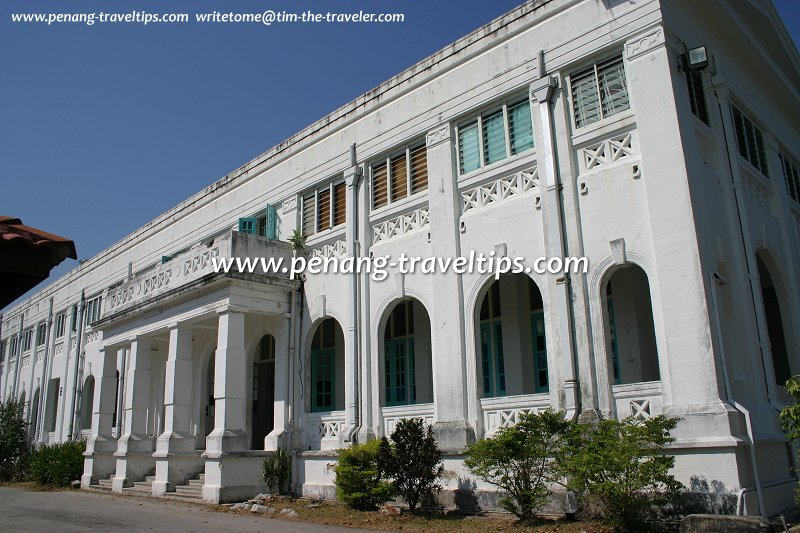 Penang Free School classrooms (29 January 2005)
Penang Free School classrooms (29 January 2005)
Headmasters of the Penang Free School
- 1816-1821: Mr. J. Cox
- 1821-1822: Mr. Churcher
- 1822-1826: Mr. Porter
- 1826-1828: Mr. Anchant
- 1828-1843: Mr. J. C. Smith
- 1843-1846: Mr. Bruton
- 1846-1853: Mr. Fitzgerald
- 1853-1871: Mr. J. Clark
- 1871-1891: Mr. G. Griffin
- 1891-1904: Mr. W. Hargreaves
- 1904-1925: Mr. R. H. Pinhorn
- 1925-1926: Mr. W. Hamilton
- 1927-1928: Mr. D. R. Swaine
- 1928-1929: Mr. L. W. Arnold
- 1929-1931: Mr. D. W. McLeod
- 1931-1933: Mr. M. R. Holgate
- 1934-1946: Mr. L. W. Arnold
- 1947-1949: Mr. D. Roper
- 1949-1950: Mr. M. F. Crocopile
- 1950-1951: Mr. P. F. Howitt
- 1951-1957: Mr. J. E. Todt
- 1957-1963: Mr. J. M. B. Hughes
- 1963-1969: Mr. Tan Boon Lin
- 1969-1971: Mr. Poon Poh Kong
- 1972-1974: Mr. K. G. Yogam
- 1974-1979: Dr. Goon Fatt Chee
- 1979-1983: Mr. R. Visvanathan, P.J.K.
- 1983-1988: Mr. G. Krishna Iyer
- 1988-1993: Mr. Goh Hooi Beng
- 1993-2000: Mr. Hj. Ismail bin Ibramsa
- Jan 2000-Dec 2000: Mr. Abdul Rahman
- 2001-2006: Mr. Arabi Sulaiman, P.K.T.
- 2006-2006: Mr. Mohd Yusof bin Omar
- 2006-2012: Mr. Hj. Ramli bin Din
- 2012-present: Mr Jalil bin Saad
Penang Free School House Colours
The students at Penang Free School are split into six houses namely Cheeseman (red), Hamilton (yellow), Hargreaves (brown), Pinhorn (blue), Tunku Putra (orange) and Wu Lien Teh (green).Penang Free School Anthem
The Penang Free School Anthem is the de facto school song. Also called The School Rally, it was composed by a teacher at the school, Mr. G.S. Reutens. The music and lyrics of the song was completed in 1966, the year Penang Free School celebrated its Sesquicentenary. Although it was not sung during the Speech Day of 1966, the music score appeared in the school magazine of that year, and it was sung on Speech Day of the following year.Mr Reutens had insisted that the song not be called the school song, because he was not an Old Free. Nevertheless, having served the school for 17 years, he is regarded as much an Old Free as any student who had passed through its gates, and the song he composed in 1966 has since been cherished by generations of PFS students.
Chorus
Let us march onto fame,
Let the aisles proclaim,
Till our anthem will dare us to do;
Let us onwards to win and new laurels gain,
Free School for the brave and for the true!
Verses
It matters neither how straight the gate,
Nor how charged with dangers the goal;
Let the tempest rage and fell odds inflate; We'll to it with heart and soul.
When duty calls be it school or state,
We'll do it with God by our side;
For the sons of Free School don't hesitate,
Nor let cool their zeal and pride.
Let us all then join in this Jubilee,
All with one loud voice to proclaim;
Our true loyalty and our constancy,
To our mater still remain.
Roads named after Penang Free School Headmasters
The roads named after past headmasters of the Penang Free School include Cheeseman Road, Hamilton Road, Hargreaves Road, Hutchings Garden and Pinhorn Road. Jalan Tunku Abdul Rahman and Wu Lien Teh Road are two of the roads in Penang named after prominent former students of the school.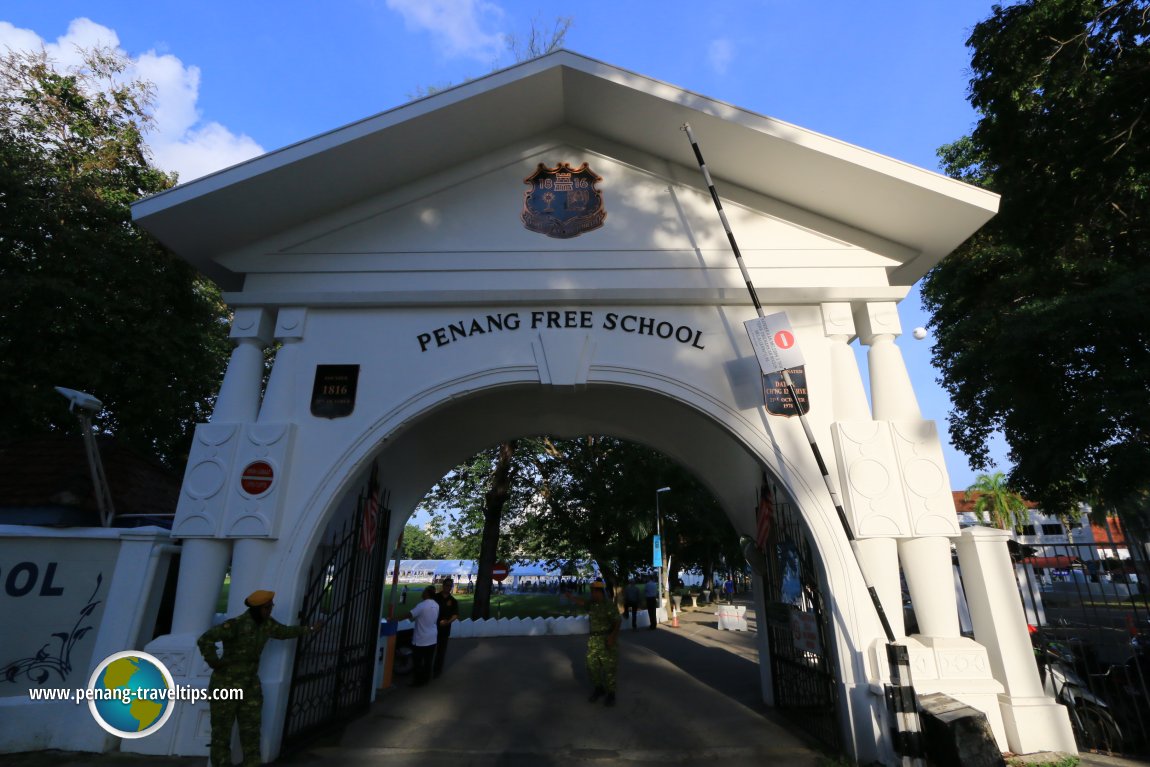 The Penang Free School Main Gate (21 October 2016)
The Penang Free School Main Gate (21 October 2016)
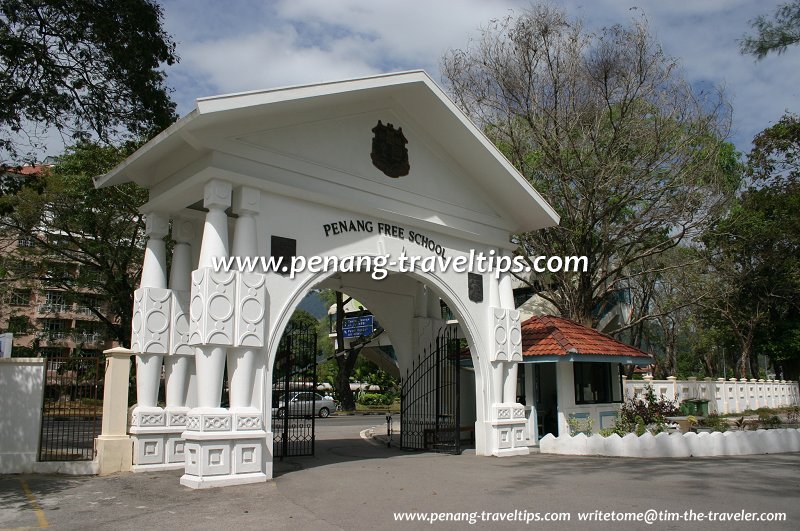 The Penang Free School main gate which was declared open on 29 September 1979 (22 January 2005)
The Penang Free School main gate which was declared open on 29 September 1979 (22 January 2005)
Getting there
The nearest bus stop is along Green Lane in front of the school. The bus stop is served by Rapid Penang bus 102, 206 and 304.Location of the Penang Free School
List of Schools in Penang and Schools in Malaysia
Private Guided Tours of Penang
If you are seeking private guided tours of Penang, message Penang Tour Guides at penangtourguides@gmail.com and enquire with them. Buy, rent or sell properties in Penang
Buy, rent or sell properties in Penang
Do you have a property for sale or to rent out? Are you looking to buy or rent a property? Get in touch with me. WhatsApp me (Timothy Tye) at 012 429 9844, and I will assign one of my property agents to serve you. I will choose the agent for you, according to your property needs. So when you message me, provide me some details of what you need, whether to sell, to buy, to rent or to rent out, and what type of property, is it condo, apartment, house, shop, office or land. Latest updates on Penang Travel Tips
Latest updates on Penang Travel Tips
 Map of Roads in Penang
Map of Roads in Penang
Looking for information on Penang? Use this Map of Roads in Penang to zoom in on information about Penang, brought to you road by road.About this website

Dear visitor, thank you so much for reading this page. My name is Timothy Tye and my hobby is to find out about places, write about them and share the information with you on this website. I have been writing this site since 5 January 2003. Originally (from 2003 until 2009, the site was called AsiaExplorers. I changed the name to Penang Travel Tips in 2009, even though I describe more than just Penang but everywhere I go (I often need to tell people that "Penang Travel Tips" is not just information about Penang, but information written in Penang), especially places in Malaysia and Singapore, and in all the years since 2003, I have described over 20,000 places.
While I try my best to provide you information as accurate as I can get it to be, I do apologize for any errors and for outdated information which I am unaware. Nevertheless, I hope that what I have described here will be useful to you.
To get to know me better, do follow me on Facebook!
Copyright © 2003-2025 Timothy Tye. All Rights Reserved.

 Go Back
Go Back